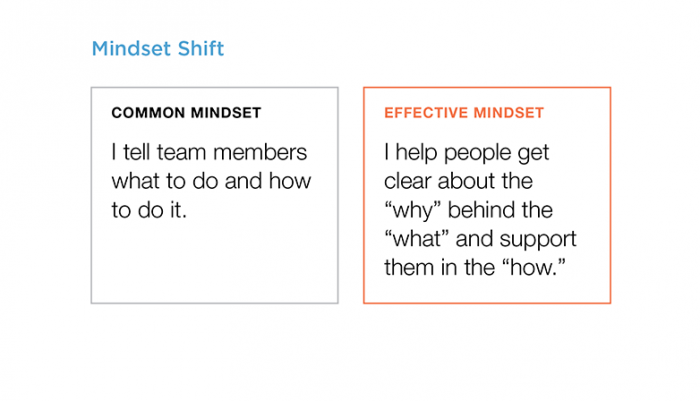Leading a team requires a different mindset than working as an individual contributor. Explore the critical mindset shifts that will maximise success as a leader of others.
Practice 3: Set up Your Team to Get Results

The why, what, and how.
It’s tempting for leaders to fall into the habit of telling people what to do and how to do it. It can seem faster, more controllable, and guaranteed to succeed, but it shuts down team creativity and ownership, places a huge burden on the leader, and destroys trust.
Effective leaders are clear about the value and contribution of their team’s work to the organisation because they align it to the organisational priorities. Effective leaders define and communicate the team’s goals and desired results. They clarify the significant outcomes that represent fulfillment and success for their team. And they ultimately delegate the work while providing the right level of support.
To be an effective leader, individuals must shift from thinking ‘I tell team members what to do and how to do it’ to ‘I help team members get clear about the “why” behind the “what” and support them in the “how.”’
Scalable Engagement
If people are doing their jobs solely because their boss told them to, team engagement becomes diminished. If leaders tell their teams exactly how to debug the code, write the grant application, or achieve a goal—they’ll be doing the same thing a year from now. It’s not scalable.
In contrast, the effective mindset helps teams become invested in decisions and understand the big picture behind the daily grind. Great leaders plan goals with their teams rather than for them, and delegate tasks without abandoning or micromanaging.


The challenge is to create a shared view of what is important—what matters most.
Free Guide
Crucial Insights For First-Level Leaders
Leading a team requires a different skillset than working as an individual contributor.
Register for an Event
Live, On-line
Discover how FranklinCovey’s world-class solutions will allow your organisation to expand its reach, achieve business outcomes, and sustainably impact performance.
The 6 Critical Practices for Leading a Team™
Increase engagement of team members by conducting regular 1-on-1s, deepen your understanding of team member issues, and help them solve problems for themselves.
Create clarity about team goals and results; delegate responsibility to team members while providing the right level of support.
Give feedback to develop team member confidence and competence; improve your own performance by seeking feedback from others.
Identify specific actions to help team members navigate and accelerate through change and achieve better performance.
Use weekly planning to focus on the most important priorities, and strengthen your ability to be an effective leader by applying the 5 Energy Drivers.
Learn more about Practice 3
For additional information please contact our Client Partners on 1800 786 346 or via email [email protected]















